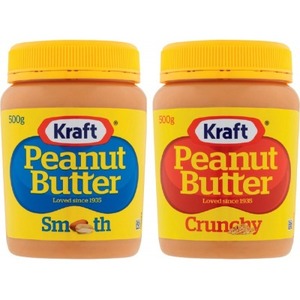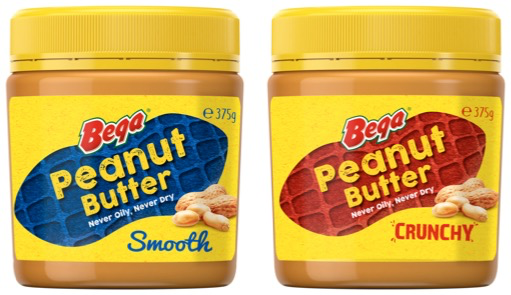Bega Claims the Peanut Butter Throne in $60 Million War With Kraft Heinz
What you need to know
- Under Australian law, an entity can't transfer an unregistered trade mark to another entity without also transferring its entire business.
- To transfer a trade mark without transferring a business, the transferor first needs to register its trade mark.
- Failing to register a valuable trade mark used in a business can have major unforeseen consequences in the context of M&A transactions, especially where the business is operated by a subsidiary in a corporate group.
On 1 May 2019, the Federal Court of Australia delivered its judgment in the long-running intellectual property (IP) dispute between global food powerhouse, Kraft Heinz Company (KHC), and Australian dairy company, Bega Cheese Limited (Bega)1. 
The Court has declared2 that KHC's Australian subsidiary engaged in misleading and deceptive conduct and passing off by selling Kraft-branded peanut butter products in the packaging shown right.
For Australian consumers of peanut butter, the Court's decision may come as a surprise considering that similar looking Kraft-branded products to these have been widely available in the Australian marketplace for many years. In fact, Kraft-branded peanut butter in jars featuring a yellow lid, a yellow label and a blue or red peanut-shaped graphic (Kraft Jar Design)3 have been available in Australia since as far back as 20074. Not only that, but Kraft-branded peanut butter products in the Kraft Jar Design have, until recently, dominated the Australian marketplace with a whopping 65% market share as at 20175 and annual sales of AUD60 million6.
 So where did it all go wrong for KHC to now be legally barred7 from using the Kraft Jar Design to sell peanut butter in Australia? And how did Bega manage to become the undisputed owner (at least for now8) of the Kraft Jar Design which it's currently using for its own peanut butter products, shown right?
So where did it all go wrong for KHC to now be legally barred7 from using the Kraft Jar Design to sell peanut butter in Australia? And how did Bega manage to become the undisputed owner (at least for now8) of the Kraft Jar Design which it's currently using for its own peanut butter products, shown right?
Spin-offs and roundabouts
To understand how the Court reached its decision, it's necessary to first understand a long and convoluted factual history. Rather than spend pages and pages writing about this, we've condensed the key details into a handy infographic below (click image to enlarge):
The million dollar question: who owns the Kraft Jar Design?
The Court's judgment is a hefty 176 pages, which reflects the convoluted factual history and multitude of claims and cross-claims that needed to be considered in deciding the case.
At the end of the day though, the case really boiled down to one key question: who owns the Kraft Jar Design in Australia?
On the KHC side it was argued that the Kraft Jar Design was owned by KHC's IP holding company which, it was said, acquired all rights to the Kraft Jar Design as part of the 2012 spin-off (see infographic above). In support of this position, KHC's IP holding company made the following submissions:
- As part of the 2012 spin-off, the Kraft Jar Design was formally assigned as "trade dress" to KHC's IP holding company (which at the time was a subsidiary of KHC's predecessor, Kraft Foods Group Inc).
- Since the 2012 spin-off, all relevant parties had been operating pursuant to a formally agreed licensing arrangement whereby KHC's IP holding company was licensing the Kraft Jar Design to be used in Australia.
- Since the 2012 spin-off, all use of the Kraft Jar Design in Australia had occurred under the ultimate control KHC and its predecessor.
- The Kraft Jar Design was not capable of generating any goodwill independently of the goodwill generated by the Kraft brand, because the two had always appeared together on peanut butter jars in Australia.
Bega on the other hand argued that it became the owner of the Kraft Jar Design as a result of its 2017 purchase of the Mondelez Australian peanut butter business, which Mondelez Australia (Foods) Ltd had been operating since before the 2012 spin-off. In support of this position, Bega made the following submissions:
- The goodwill generated by the Kraft Jar Design, as an unregistered trade mark, arose solely from the Kraft Jar Design being used in the course of the Mondelez Australian peanut butter business.
- As the operator of the Mondelez Australian peanut butter business, Mondelez Australia (Foods) Ltd owned all goodwill generated by the Kraft Jar Design used in that business.
- Mondelez Australia (Foods) Ltd was not a party to any of the agreements executed as part of the 2012 spin-off, and it never assigned its goodwill in the Kraft Jar Design to KHC's IP holding company or to anyone else prior to transferring its business to Bega in 2017.
The Court's decision and lessons learned
In weighing up the parties' competing positions, the Court ultimately held that:
- The Kraft Jar Design was first used as an unregistered trade mark in relation to the Mondelez Australian peanut butter business in 2007,9 and that Mondelez Australia (Foods) Ltd (which was at that time was named Kraft Foods Limited) was the owner of the Kraft Jar Design by virtue of it owning the Mondelez Australian peanut butter business.10
- The Kraft Jar Design was never validly transferred to KHC's IP holding company as part of the 2012 spin-off,11 and it thereafter remained in the ownership of Mondelez Australia (Foods) Ltd as the owner of the Mondelez Australian peanut butter business.
- By acquiring the Mondelez Australian peanut butter business in 2017, Bega became the rightful owner of the Kraft Jar Design in Australia.12
- The subsequent use by KHC's subsidiary of the Kraft Jar Design for its own Kraft-branded peanut butter products (shown at the start of this article) amounted to misleading conduct and unlawful passing off because only Bega has the exclusive right to use Kraft Jar Design.13
The Court's judgment also clarified some important legal principles in relation to the nature of goodwill and its relationship with unregistered trade marks in Australia, as follows:
- Goodwill generated by an unregistered trade mark which is first used in the course of a particular business will belong exclusively to the owner of that business.14
- The only way to transfer ownership of an unregistered trade mark is for the associated business to be transferred.15
- An assignment that purports to transfer an unregistered trade mark without an associated business transfer is ineffective under Australian law.16 This can be so despite the parties to the purported assignment explicitly agreeing to the contrary.17
- If "Person A" runs a business using a registered trade mark owned by "Person B" (who may, for example, be a third party licensor or an IP holding company related to Person A), then any goodwill that arises from Person A using the registered trade mark in Person A's business will not belong to Person B merely because Person B owns and controls the trade mark.18
- Distinctive features and packaging of products can generate goodwill independently of goodwill generated by a primary brand that appears on the same products. This is true even if the primary brand and distinctive features/packaging are always used together.19
To download a print-friendly version, click here.
1 Kraft Foods Group Brands LLC v Bega Cheese Limited (No 8) [2019] FCA 593 (1 May 2019) (Judgment)
2 Orders dated 21 May 2019
3 Judgment at [3]
4 Judgment at [71]
5 Judgment at [62]
6 Judgment at [33]
7 The Court's orders on 21 May 2019 include an injunction restraining KHC's Australian subsidiary from using the Kraft Jar Design
8 It is anticipated that KHC's Australian subsidiary will appeal the Federal Court's decision. If this occurs, it is unlikely the outcome of any appeal would be determined prior to 2020
9 Judgment at [71]
10 Judgment at [183] and [184]
11 Judgment at [322]
12 Judgment at [398]
13 Judgment at [475]-[476]
14 Judgment at [168]
15 Judgment at [166] and [169]
16 Judgment at [322]
17 Judgment at [323]
18 Judgment at [155]
19 Judgment at [162]
This publication/newsletter is for informational purposes and does not contain or convey legal advice. The information herein should not be used or relied upon in regard to any particular facts or circumstances without first consulting a lawyer. Any views expressed herein are those of the author(s) and not necessarily those of the law firm's clients.





